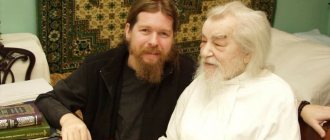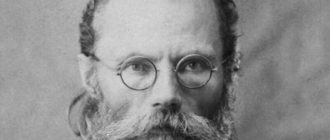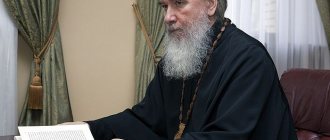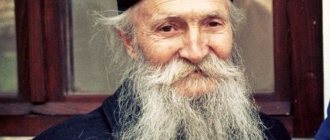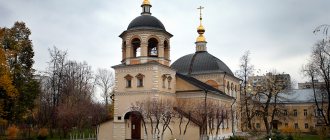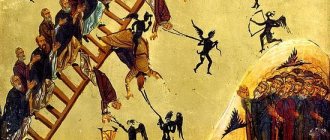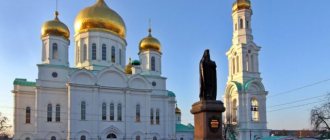Archpriest Artemy Vladimirov. Conversations about spiritual life.
Question: Many people are now reading patristic literature about prayer, about paying attention to yourself, to your thoughts. But it is not always clear to a modern person, especially one who does not have a spiritual mentor, that everything in these works of the Holy Fathers of the Church is clear. For example, what does it mean to accept and not accept a thought when it slips by so quickly that it is unclear whether it is an excuse or something more?
O. Artemy: What does it mean to accept and not accept a thought that slips through very quickly? I think that anyone interested in mental warfare, the fight against thoughts, should always keep in mind what the ascetic ideal is. What should a Christian’s inner world be like, what should he strive for? And the desire is correct for those who would like to completely free themselves from the whirlwind of thoughts. A pure mind is a person’s soul, freed from the violence of passions, which always manifest themselves in certain thoughts, testifying to what passions lie in the depths of the soul.
And of course, only God can renew the mind and heart of His disciple, and we ourselves are not able to throw off the oppression of thoughts. We must remember well, say the Holy Fathers, that behind every thought hides a fallen spirit. And the thoughts operating in us, although this is not always noticeable, are carriers of demonic or cosmic energy. Therefore, a person who goes into excessive straining of these thoughts, painfully looking closely at those thoughts, fleeting desires that flash through his soul, is in greater or lesser danger. Demons are too sophisticated, cunning, and they often benefit from the desire of a new Christian thinking about prayer to fight with thoughts, to fix attention on them, to separate the wheat from the chaff. I myself suffered so much from this that now I understand these patristic warnings.
Imagine a man walking through a thicket towards the light that glimmers ahead. It would be right not to pay attention to the blackberry bushes that cling to clothes, to the burrs, to the wolfberry branches whipping in the face (if anyone knows such bushes). The path may already be overgrown; no one has walked along it for a long time. But you see the final goal and push the nettles with your hand, despite the burn and scratches, onto the rhizomes that your boots cling to, you go in the direction you have chosen and achieve success. On the contrary, if you stop and begin to consider what hooked you, who bit you, if you pay too much attention to these troubles, you may go astray and not achieve what you are looking for.
Therefore, in spiritual life, for a person who really devotes himself to acquiring the spirit of prayer, a certain simplicity, even a certain rudeness, is needed. You can’t be too thin-skinned or impressionable, because you will start chasing these “fleas” and “midges”, and they are happy to flicker before your mental gaze. This is how the demon acts: it runs around, clouds consciousness, leaving a trace on the “mental display”, and is very fond of those who immediately rush at these, as physicists say, quarks. Scientists are chasing quarks and trying to grab alpha, beta, gamma particles by the tail in order to capture them in this hadron collider.
It is very dangerous to go into such subtle research: did I accept the thought or not, did I bring irritability to my heart, or did it fly by like a bullet, leaving a barely noticeable scratch. Did I formulate the unchaste idea that migrated from the computer to my soul, or did I not have time? You are preparing some kind of student work, and some hooligans are jumping across the fields of the monitor, making a pass at you. And you look at the text that your supervisor sent you, and you yourself think: how long will she have the impudence to do this to me with a pen?..
We are all doomed to be novices for life, and the enlightenment that the ancient hermits had, tracking and characterizing demons (more evil and less harmful), does not threaten us, of course. It is very important for us to have simplicity, and although the soul may be dark, the original initial virtue is walking before the Lord, placing oneself before His invisible face. We believe that God sees us, hears us, loves us, leads us, and no matter how passionate and infected you may be, the light is Christ Himself, invisibly present and listening to us. And to Him, as Peter once looked at the Savior while walking on the waters, a Christian must always direct his spiritual eyes, and not pay too much attention to Satan’s work and whirlwind of thoughts, to images, sensations and thoughts. Otherwise, you will be like some forest animal who, having shown curiosity about a piece of lard, fell into a trap with a hoof or paw. Demons immediately bind the mind and deprive a person of the memory of God when he begins to fight with his thoughts and strays from the straight path. We priests sometimes have to meet such students at confession. I have these in my memory. You always pay attention to them. Once such a student came to me. The boy is concentrated, a little anxious, with a restless gaze, and speaks in a quiet voice. He begins to confess, and you are suddenly surprised at the subtlety of discerning thoughts. “During the day, I was inspired to take the olive that was left over from breakfast. But I said to this thought: “It’s not time yet”... At first you think what an exalted, subtle soul. He continues: “My nature felt an attraction down to the bed. I decided to test what it was: weakness or laziness? I decided to lie down and try to continue praying, but the prayer did not disappear. I realized that I needed rest..."
Sometimes you meet people with a surprisingly subtle organization of the soul, some kind of subtle self-restraint. If anyone has read, for example, the questions and answers of Barsanuphius the Great and John the Prophet - a classic work - there the monks ask their teachers. They have an amazingly subtle inner world, thanks to the fact that they live in a monastery, next to enlightened elders, they observe themselves - this is called “listen to yourself.” For example, they ask about mutual relationships: “My brother brought a quilted blanket to my cell. My thoughts told me that he did it out of vanity. Abba, should I take the blanket or not, because I have desecrated this gift in my soul?” For us it’s simpler: “What have you come for? Blanket? Fine". And with what thoughts he brought it - it doesn’t matter...
But let's return to our student. Let’s say there was a priest who listened to him. The student will go to him and bring his charters. He brings and brings these, but pastoral experience shows that this cannot last long. The evil one deceives people who think that they are given the ability to understand their thoughts, like some goldsmith who has beads in a box, floss or something else. It is impossible in our time to deal with such spillikins for a long time. And, as a rule, this ends badly, with some kind of mental damage, because as a result the person absolutely believes in himself, trusts his dispositions.
This is the most difficult contingent of confessors, because you listen to him for ten minutes, and he concludes: “Here, father, my thought tells me that you are instructing me insincerely, but only out of duty, that you are doing this not from the abundance of your heart, but because It's a sin not to listen to me. Your eyes are cold." And as a rule, demons take over a person, and he leaves in search of something better, or falls into serious conditions. I tasted this goodness myself...
And it would be necessary to get to Father John (Krestyankin), who would call a spade a spade: “Do you know what you are digging into?” - “I pay attention to myself.” - “You’re not paying attention to yourself, but you’ve fallen into a public toilet and are raking with your hands what’s floating towards you!..”
The ability to abstract from numerous internal barriers and obstacles is the key to spiritual health. Let's say you come to the north, where architects are restoring a monument of wooden architecture. There are such mosquitoes that you can beat them, scratch their bites, and the locals don’t pay attention to them at all, because they have developed immunity. And in six months you will also be above all these pinpoint bites.
And a Christian today definitely needs to be a little thick-skinned, to avoid this painful sophistication. To do this, you need to keep busy - a busy bee has no time to mourn. Being too introverted can lead to bad results. But true attentiveness to the soul lies in the ability, like a duck, to swim from wave to wave and shake itself off, keeping oneself calm.
Question: Many people complain that, without condemning in words, they condemn mentally. How to get rid of the habit of instantly judging in your thoughts?
O. Artemy: Of course, through attention or correct self-view. The fact is that if the soul has been in oblivion of itself for a long time, and the evil one is accustomed to being in charge there, then somewhere next to the verbal power, from where thoughts are born, sits, as it is said in the akathist to the Mother of God, “the corrupter of meaning,” an imp. We turn to the Mother of God: “Rejoice, thou who destroyest the corrupter of meanings.” Through neglect of the soul, we develop a habit. As soon as a person approaches you, he has not yet approached you, and already something bad is stirring in his heart. Some completely undeserved and inconsistent with the true state of things, nasty thought is directly screwed into your mental stream.
But among secular people there are very conscientious ones who are generally far from sobriety and standing before God, turning to the Creator in prayer, but they do not know how things stand with their inner world. Previously, noble culture reached the point where children were taught to be ashamed of bad thoughts, unclean views, selfish intentions - this is sinful, this is ugly. Previously, there were noble people and there are still a few - people with an amazing inner world, morally stable.
It happens that a young woman takes care of her elderly relative and does it sacrificially, devoting herself to the feat of love. But suddenly she had the thought that her relative would die, and her two-room apartment would pass to her, according to the law of kinship. Or another situation: “I came to my relatives’ wedding, and the thought crossed my mind that my sister-in-law was unworthy of such a husband. It suits me better." And a person can be so horrified by these thoughts that I have met people who, even years later, when they came to confession for the first time, cursed themselves and confessed these mental sins that they had been crucifying within themselves throughout their lives. Absolutely not understanding that these movements of these nasty thoughts are precisely the work of that smuggler who has joined you and is screwing up this demonic thought, and it doesn’t even occur to you that this is not your product. And an experienced priest will say: never be impressed by the fact that some dirty trick is stirring in your thoughts, because there is rule number one in spiritual life: “Lord, this is not yours and not mine, I don’t accept it. What is not Yours is not mine.” And the presence of this dirty trick in your soul is not considered a sin if you renounce it.
The Monk Anthony the Great, the most enlightened ascetic, was as transparent as glass in the eyes of God. And one day one monk asked: “What does the number of the Israeli regiments mean in the book of Moses in Leviticus?” He says, “Brother, symbolic interpretation of subtle passages of the Holy Scriptures is not good for you. But for the love of Christ, wait a little, I’ll go and ask.” He went outside the outskirts, prayed to Moses, the prophet Moses appeared to him and explained what this meant in relation to spiritual life. He returned and told the monk, but forbade him to ask such questions in the future.
In the complete biography of Anthony the Great, there was such a case when some sophist, convinced of the completely heavenly origin of wisdom and being powerless to fight him with his syllogisms, turned to a sorcerer so that he would tie up Saint Anthony. Because the sophist no longer had enough dialectical arguments, and he chose some kind of magician like that. For a triple fee, the magician promised to cheat Antonia on the first day. And he summoned a whole cloud of demons, such a rapid response battalion, and they attacked the ascetic. This story somehow came out, and Saint Anthony was asked what he felt on the third day, when, through the magic spells of this magician, the entire satanic army rushed towards him. And he said that I felt a special struggle, an intensification of thoughts. But he also argued that every Christian is clothed in the Divine invisible luminous power, which clothes the mind and heart of the ascetic, and he always walks clothed in the whole armor of God. And having already perfected himself in this mental warfare, Saint Anthony said that demons approach in the form of a thread-like thought, usually very specious, a wolf hiding in sheep's clothing. And Saint Anthony, already from a distance, sensed in spirit who had come to him, and cast down these thoughts, that is, he discerned their demonic nature, so that they no longer penetrated his heart, he simply pushed them away. The same was the Monk Matthew the Perspicacious (in the Kiev-Pechersk Patericon it is written about him), who drove demons away like midges, and they could not even get close to him.
We, of course, are also plagued from within; demons arouse in us unresolved passions. This can be a very strong pressure. However, your constant denial: “Lord, this is not mine, not mine, Lord, help me.” A classic example is known when some ascetic was consumed by fornication for three days and three nights, she was, as it were, consumed by fire and completely despaired, because this came to her after ten years of completely heavenly residence. And then it was revealed to her that the Lord was with her in this terrible struggle, imperceptibly for her, precisely because she rejected this state, although it consumed her soul and body from the inside.
And the Mother of God, filled with incomprehensible humility and purity, endowed with the power of the Holy Spirit from childhood, was impregnable to the influence of these mental cockroaches. And this bright cloud, as it is said in many patristic writings dedicated to the Mother of God, clothed Her, and therefore all the vileness of the Pharisees, these Talmudic spiteful critics (the Talmud contains terrible blasphemies against the Mother of God), did not concern Her.
Recently someone asked me what blasphemy against the Holy Spirit is. In the story of the resurrection of Lazarus in the Gospel of John the Theologian, we read that many came to Bethany and believed in Christ for the sake of Lazarus, whom He raised from the dead. And the high priests gathered and said: “We have no time for anything, the whole world is following Him.” And they decided to kill Lazarus. This is blasphemy against the Holy Spirit, because the clear work of God’s omnipotence and power is the resurrected Lazarus. And the desire to kill Lazarus as an irrefutable witness of the Divinity of Christ, of course, is blasphemy against the Holy Spirit.
Yes, and they guarded the Mother of God until her death. If you know, they even wanted to overturn Her bed. It was an organized campaign, but somewhere I read that, despite all the blasphemies they showered on Her (She went to the Mount of Olives every day and prayed there), and despite the evidence, She was not touched by the hands of the murderers of Her Son. And this is thanks to God's protection.
Some people ask how to live when there is obscene language around, in student corridors, school locker rooms, and in public places. The girls say in confession that bosses give tasks, peppering their speech with disgusting abuse. During the theatrical run-through, directors give valuable instructions to the actresses, many of them are clean and decent people. How do you even live in this world? All this verbal infection and pus simply fills the mental space. But there is only one answer: pay attention to yourself, call on the name of Christ, clothe yourself with this name as a cover, with bright robes. And the Mother of God sets an example that She remained invulnerable to demonic energy, which could not even get close to Her. Of course, we have a different kind of abuse, a dictate of thoughts.
Therefore, not judging in your thoughts is really very important. The Monk Ambrose of Optina calls chastity the property of the soul not to accompany with any comments the actions, appearance and departure of a neighbor. If this censor or some kind of commentator lives inside you, who accompanies the actions of your neighbors with abundant reasoning, this is a property of a fallen nature. Even if external appearance and presentability are preserved, all sorts of vile things and derogatory characterizations of neighbors can happen inside a person. The person who really strives to be under grace, entrusts everything to the Lord, gives his neighbor to God with all his guts - this is called dying for people. As they say, if you don’t die for people, you won’t come to life for God. This tree, as Pimen the Great says, is the tree of the knowledge of good and evil, from which you should not eat. Your neighbor is not your diocese. This is not your business. “Know yourself, and enough is enough for you.” Pay attention to yourself. “Sit, frog, in your puddle and don’t croak, so that something worse doesn’t happen.” And this, of course, is the ideal to which we must strive, in order to drive this long-tongued, forked-tongued internal commentator out of the soul.
A person who does not judge receives from God a very special gift and ability: you see God’s creation and do not delve into its soul out of reverence for the Lord and for the secret life of your neighbor, which exceeds your comprehension. This is God's creation, with everything that fills it. And a person receives a reward for this indifference or detachment, alienation, receives sympathy, which is given, just as grace is given to us.
In this regard, it is easier for a priest, because completely different people come to him for confession as a doctor. Healthy and sick, not everyone is happy. And his task is to accept everyone with pastoral participation, to heal or promote healing. It’s very easy for priests, they have a blessed calling, and by their very calling they should feel sorry for people and sympathize with them...
Question. How not to judge when people do obvious evil? And when this is discussed and there is nothing to object to, especially in a secular environment, where words about the dangers of condemnation will not be understood at all?
O. Artemy: The Holy Apostle John the Theologian says that Christians do not need to be taught as fools are taught. Christ's disciples are given an anointing from the Holy Spirit, which teaches them everything.
First of all, it teaches you to distinguish between good and evil. Being partakers of the grace of the Holy Spirit, which makes the testimony of conscience more accurate and definite, we are able to evaluate everything that happens under the moon: to distinguish between light and darkness, good and evil, truth and falsehood, truth and error. Having met a person who has become a servant of darkness, through whom the spirit of hatred and destruction operates, we will, of course, be able to unambiguously qualify his actions. God Himself and the Holy Scriptures demand this from us, testifying: “do not participate in the works of darkness,” “sweep away from every evil thing,” “provide your members as instruments of righteousness, and not as instruments of uncleanness.”
Correctly assessing every human act - good or evil - we, unlike the pagans, look at the personality of the speaker and the actor, always seeing in her the image of God. This image can be darkened, distorted, disfigured, or it can be clarified and luminous.
If we meet a depraved person, whose conscience is seared, who is caught by the devil, who does his will, i.e. sows evil and misfortune in the world, we should pray that God will not allow him to multiply evil, put a barrier to the outrage he is causing, enlighten him, soften his heart, and turn him to repentance. The Russian people have put together a wise proverb about this: “Love everyone, run from everyone.” Christ Himself sets an example for us when He moved away from people infected with malice and hatred to another city.
Of course, if we are talking about helping neighbors and friends, then a Christian resists evil, not with retaliatory evil, but with good force. Up to self-sacrifice, according to the commandment of God.
So, seeing the example in Christ, remembering how He grieved in soul over the hardness of the hearts of the Pharisees and scribes, infected with the spirit of blasphemy, we are called to preserve our hearts from the violence of hatred, bitterness, and embitterment. But we can and must mourn the destruction of human souls who voluntarily became an instrument of the evil spirit.
When certain topics are discussed and we are not sure that our words about the harm of condemnation will be understood and accepted, we need to emphasize our reluctance to participate in this gossip and slander. This must be done so as not to participate in common sin. To testify to our reluctance to listen to such speeches, to assent to something contrary to the warning of our own conscience.
“I don’t want to participate in this conversation.” “You’ll forgive me, but I’m not inspired by such topics.” "Let's talk about something else." One way or another, a Christian can put an end to it and make it clear to the interlocutor that he will not participate in the development of this topic.
Interviewed by Tatyana Radynova
https://www.hram-ks.ru/Propov_text/prop52f4ddfb5a497.php
Archpriest Artemy Vladimirov: About the path to faith, life in a major, successes and mistakes
It's almost impossible to talk to him. Technically. Even if you move far from the temple and sit behind the trees. You manage to ask one question, and now new parishioners come with questions and requests. However, this is the case with any rector of a large parish, only Archpriest Artemy Vladimirov lives on the territory of the Church of All Saints in Krasnoye Selo, which means it’s easier to find him, although he himself calls himself a vagrant bird - he has a lot of business trips.
A graduate of the Faculty of Philology of Moscow State University, Father Artemy is one of the most famous priests in Moscow. His Eloquent style of conversation is appreciated or disliked, but this time, sitting under an apple tree (from which apples fell every few minutes and the participants in the conversation were all waiting for the apple to fall on them), we asked Father Artemy to talk about the last decades of the life of the Church and his life: about the path to Christ and the priesthood, about what he succeeded and what he failed to do in life.
— Father Artemy, I know a lot of priests serving in Moscow today who were churched in your parish. How did you find yourself in the temple for the first time?
— This was long before entering my native Moscow University. Although, in fairness, we will say that Alma Mater - the Faculty of Philology - largely contributed to the churching of many future shepherds of Moscow. It is enough to recall Archpriest Valentin Asmus, our neighbor in Krasnoe Selo, Archpriest Maxim Kozlov, rector of the university church.
When I was in fifth grade, my grandmother tried to take me to the temple, but she failed. After I graduated from school, when she passed on to another world, my soul itself drew me to the temple, where during the last years of her life my grandmother communed the Holy Mysteries and shared with us some extraordinary joy that shone in her eyes.
As a university student, I entered the temple, which became dear to me, in honor of the holy prophet Elijah, on Obydensky Lane. Still not knowing anything about the Divine Liturgy, about the communion of the Holy Mysteries of Christ, I froze in my tracks when I heard words hitherto unfamiliar to me coming from the choir. Three or four pretty old women sang: “...Blessed are the merciful, for they will receive mercy. The blessed are the pure in heart, for they will see God...”
My soul opened up at these words, and I forgot everything around me. Now I understand that this was probably my first experience of genuine prayer.
I came to my senses when the priest brought out the Holy Chalice - I didn’t know what was in it, who was it for? But my heart then told me: “This is for you.” After watching others cross their arms, I timidly approached the priest. This was the late Archpriest Alexander Egorov - a book of memoirs has now been written about him. He turned to me with great warmth and condescension with the words: “Darling, have you confessed?”
Of course, I was not so naive as not to know what was meant by the word “confession,” and, stepping aside, I wept bitterly. Although he was already a seventeen-year-old boy.
These were unexpected cleansing tears - naive, kind. Leaving the temple, heading towards the university, I continued to cry like a child. I felt as if some kind of scab was melting. The soul was freed from under the snares of unbelief. I remember that first visit to the temple, which became the beginning of a spiritual path.
- But so far this has not yet been a coming to the Church...
“I remember, quite unexpectedly, in the university library, among the learned tomes, I saw, unknown by someone, a book offered to me about the ordeal of Blessed Theodora with a list of all sins! Having opened it out of curiosity, I rewrote it until the end of the library, feeling that everything in it was presented in accordance with my life. My cheeks were burning, my soul seemed to want to jump out. Such excitement overwhelmed me... and a few days later, with a huge charter of sins (starting from the age of six), prepared completely independently...
- They came again!
- It’s easy to say - I’ve arrived! It was a struggle! I was scared! Some sly voice told me: “Not now, come later! Well, what do you say to the priest who thought that you were a decent person?”, and another voice - conscience - prompted: “Now and only now! Delay is like death! And this voice defeated the Guardian Angel.
I don’t know how long I confessed – 10, 20 or 30 minutes. They seemed like one second to me. But when the priest tenderly said: “Get down on your knees, Artyomochka!” (we were lucky to have priests back then!) and, having put the stole on me, I read a prayer, I felt that some beneficial change had taken place even in my bones. The soul became weightless, an amazing joy and peace settled in the heart! It was definitely a “bath of repentance”!
Coming out into the street in a stunned state, I was struck by some special purity of the sky; I suddenly heard the chirping of birds, and human faces seemed angelic to me. Since then I have learned what confession is, reviving the soul to a living and seeing faith...
— You studied at the Faculty of Philology, and when and how did the question of a seminary arise?
— My supervisor at the university was Nikita Ilyich Tolstoy, a famous philologist and a genuine Christian. I wrote my diploma with him
— What was the diploma about?
— About the grand-ducal lives of Saints Olga and Boris and Gleb. Nikita Ilyich, having met a not-too-zealous student in me (zeal was characteristic of me, it’s just that the spiritual path of development was not easy), repeated from time to time: “Temochka, study! The Theological Academy needs educated philologists!” I couldn’t understand then - what academy was he talking about? But with his light hand, having worked for a certain time as a teacher in several Soviet schools, I was invited to the Moscow Theological Academy as a teacher.
For more than 10 years he taught the Russian language, the stylistics of the Russian language, the Church Slavonic language, the Old Church Slavonic language, rhetoric and then even the New Testament. Thus, I had to take the exams as an external student.
— Almost the entire humanities course was taught...
“Already there, within the walls of the Moscow Seminary, I received an invitation from the rector to enter the path of priesthood. On St. Sergius, July 18, 1987, I was ordained a deacon. And 5 months later, on the night of Christmas 1988, he became a priest.
If you asked me: “What did you feel on the night of your ordination?”, I would answer you: “I was very worried, trembled, like any protege, probably.” But when with the exclamation “Axios!” the bishop laid the cross on my shoulders, I suddenly felt that what had to happen had happened. It was as if a ship, prepared in a shipyard, had been launched... And to this day I consider ordination the main event of my life.
— You were in the Church of All Saints in Krasnoe Selo almost from the very beginning of the service?
— My priestly path began with an academic church, but there were not enough services there, therefore, to my great joy, I accepted the offer to serve as a deacon in the Church of the Resurrection of the Word, which is on the Assumption Enemy (in Bryusov Lane, former Nezhdanova Street). Having become a priest, I continued to serve freelance in this church not out of fear, but out of conscience. These were the happiest years of my life! When I was offered the abbotship in Krasnoye Selo, I did not refuse and took the blessing from Father John (Krestyankin). I had to talk with this wonderful All-Russian priest two or three times.
The Church of All Saints, which was handed over to me, stood empty and ruined for several decades, with leaky domes. Thank God that it stood and was not completely destroyed!
— What did he do during Soviet times?
— From the 1960s until 1989, the archives of the zemstvo government were kept in the building of the closed church; Part of the territory was occupied by a branch of the Moscow umbrella factory located in the Danilovsky Monastery. These were special umbrellas that opened but did not close.
Unfortunately, Komsomol youth managed to smash with hammers the white marble iconostasis, which was the decoration of the Alekseevsky Monastery. But fear has big eyes. You never know what you can do till you try.
I think that our community, our parish gathered and grew stronger in these difficult but joyful efforts to revive the Church of All Saints...
— Do you remember the first day here?
“It all started with me walking around looking lost and perplexed, asking myself the eternal question of Russian life: “What to do?”
When I was studying in the English department, the department was headed by O. S. Akhmanova, a mastodon of studying the English language, and for two or three years we repeated only one phrase, with an English pronunciation:
| How do you |
| think we |
| ought to |
| start? |
Where do you think we should start?
So I thought...
I was still just a chick, but, thank God, I was surrounded by very proactive and experienced people in church building and life. The Brotherhood of St. Philaret of Moscow had already been created, which, thanks to a friendly team, “knocked out” more than one church from the departments through legal means. Things were going well!
— How did you meet the brotherhood?
“They themselves found me on Nezhdanova Street and made this offer. I then set a condition - not to burden me with estimates, bricks, or finances. My business is shepherding and teaching. Thanks to this arrangement, I still have the opportunity to do what I love, rather than sit in the cement dust.
- Competently! Are you starting to serve soon?
— Saturday, Sunday, weekdays and holidays - we still couldn’t decide on the first liturgy. They moved it several times, and finally decided - Lazarus Saturday. This was in 1991. Imagine our surprise later when it turned out that March 30 is the memory of St. Alexei, the man of God, the owner of this place! So to this day, I believe that he is setting the main milestones in the revival of his own monastery.
Tell us about the first days and months of the life of the temple.
This is youth, which is always beautiful. Happy hours don't watch! This is inspired work that will not be a burden to you, but a joy!
Services in fifteen-degree frost, when you shift from foot to foot. Bilateral pneumonia, which I had to endure (since then I have become a “heat-loving animal”). Tea parties after services (we still continue them). These include evening and night confessions - until the metro closes, when students are still standing like bunnies, waiting for their finest hour - cleansing from sins.
— How was the community created?
- “A grandmother for a turnip, a grandfather for a grandmother...” A child for a grandfather... The main principle of life should always dominate in the formation of a parish. It is not finances that determine the matter, but the reverent service of the shepherd and his openness towards human souls!
Christ commanded His followers to love, and the sign of this love is sacrifice! Mutual sacrifice of pastors and parishioners in love for their church. Some of the parishioners followed here, to the Church of All Saints, from Nezhdanova Street. The parish was young: my mother and I graduated from university, we always had many friends who were united by a common student past.
— What was the most difficult thing for you as a priest in the early years of the parish’s formation?
- Fighting your own passions. They show mercy neither to the right nor to the wrong. Self-love and pride, irritability and gluttony and other manifestations of our fallen nature.
After all, when preaching to others, says the Apostle Paul, you yourself should not be worthless, but are called to humble your body! And only then do our lips testify to the joy of Christ’s Sunday, when in ourselves, preachers, harmony reigns, agreement between mind and heart, soul and body. “Out of the abundance of the heart the mouth of men speaks.” Therefore, the most difficult thing in our wonderful service is standing before the Living God, your personal feat of repentance, prayer, and walking before the face of the Heavenly Father.
When you are young you have to work a lot. Read the diaries of Father John of Kronstadt - how he fought and crucified sin within himself; how he complained about his inattention, falling for the tricks of the enemy of the human race, that is, sinning by irritability or intemperance in food! And every young shepherd must go through this battle in the first years of his ministry.
- Does it become easier then?
“If you don’t feel slightly dizzy from imaginary successes, but treat yourself critically - you struggle, repent, take communion - twenty years later the first feeling of relief comes. It is young and green, but the grace of God greatly consoles the sincere worker in the field of Christ. Therefore, we, young priests, seemed to fly in our parishes, like larks bathing in the blue sky.
At this time, everything was changing in the country. How do you look at the 90s now?
I look with sadness at the three bison who, having gathered in Belovezhskaya Pushcha, did not know what they signed. And Great, Little, and White Rus' spread out in different directions. If the national idea had won then, instead of the vulgar democratic scenario, we would be different now.
But the life of an Orthodox parish is so rich, joyful, and full that political unrest, of course, occupies minds and hearts, but still does not have the power to dismember what God Himself gathered with His grace around the throne, around the Chalice of Christ. The life of a priest in Moscow is intense and creative. We simply have no time to be bored, sad, or sin! Because demand outstrips supply! We all live here according to the behest of V.V. Mayakovsky: “Always shine, shine everywhere... This is my slogan and the sun!”
Of course, in the 90s, many found a temple for themselves, running away from horror, hopelessness, and apathy. And the pastors, officers of the church department, had to stand on the front line. Imagine, everything was mixed up: bullets, cannonballs, horses, the whistle of shrapnel. The dead are falling, the wounded are asking for help. And the priests, like nurses, pull out the soldiers and immediately, in a military hospital, without anesthesia, they remove fragments of shells from 1812. These wounds are sewn up and covered with the balm of mercy and love. Hot suffering - we, shepherds, are like reapers on a July afternoon, when, without straightening our backs, in a sweaty linen shirt, we squeal and squeak. You gather sheaf after sheaf. And there, ahead, “the yellowing field is still agitated,” “and the crimson plum is hiding under the sweet shadow of a green leaf”!..
RESULTS OF THE 20TH ANNIVERSARY
— What have you failed to do in your parish over the past twenty years?
— A lot of things didn’t work out. Mostly I only see flaws and mistakes. But I will confess, since you ask!
First, we failed to grow the wings of inspired prayer that parishioners expect from priests. However, I don't lose hope.
It was not possible to unite the priests of my parish as much as I, the rector, would have liked. This is the age now when everyone is more occupied with their private, family interests, while the success of a common cause depends more on the team, on unanimity, unanimity.
It was not possible to raise parishioners to be as friendly and quick to help each other, as the Christian conscience requires. The people are tired of themselves, of life. Here, one parishioner’s father is lying in a distant hospital near Moscow. He has a serious illness similar to leukemia. In a modern hospital there is no blood - at least for ordinary people. They put up a notice “Help urgently needed” and a telephone number. This call hung on for two days, but so far there was no answer. Meanwhile, sometimes life cries out for a decision that you must make now. And delaying death is like...
What hasn't worked yet? It was not possible to create a “garden city” in Krasnoye Selo. It was not possible to build Kitezh-grad to protect against Auchans and swimming pools. Although we believe that in the near future, monastery buildings in the Russian-Byzantine style will stand along the perimeter of this large territory, in stylistic unity with the architecture of the temple.
It was not possible to get the teachers of our school a decent salary. Due to the fact that this alternative educational institution, although licensed and accredited, is experiencing a constant financial crisis. It was perhaps not possible to raise education to the level at which the best schools in the capital are located.
But it’s not the victory that’s important, it’s the participation! At least we still have vital activity! The desire to make life more beautiful and more fun is already a lot! Today it is so easy to fall asleep with a glass of non-alcoholic beer in one hand and a hamburger in the other... I am happy to admit that I have never been to McDonald's.
— How do you evaluate twenty years without persecution?
“It seems to me that now we are all witnessing a process of moral polarization.
On the one hand, Christian enlightenment is taking its victorious steps. Just today, when I drove into the city of Reutov, located on the outskirts of Moscow, I saw two such beautiful churches in the Russian style that it’s so lovely to look at, you can’t take your eyes off them! And it is, of course, wonderful that our compatriots see God’s beauty and can enter God’s temple and open their hearts to the grace of the Lord. Of course, this is a huge merit not only of the hierarchy (although we need to talk about the works of His Holiness the Patriarchs, the priesthood), but also of the good parishioners who, like fireflies, leave the service and carry lamps of hearts lit by prayer into this dark world.
And at the other pole is the savagery of society. We are all witnesses of geopolitical processes, disintegration, weakening of power at all levels. Statehood is being destroyed, as if some kind of bark beetle has taken root and the sweet remains of Russian statehood are chewing and chewing... And also healthcare, educational activities...
But let's not look for enemies - God marks the rogue! We notice that human hearts are becoming more amorphous. Today everyone is building their own little world, but people have few of the original Russian character traits - the ability to root for the fate of the nation, the country, the Fatherland, its future. However, we still have it.
We will still never turn into mankurts, despite all the efforts of our foreign partners! Today the difference in potential is obvious. Today is the third millennium, the time of self-determination - towards light or darkness, towards creation or destruction. We have been given a short time of freedom, when everyone is free to make up their mind. What will tomorrow bring us?..
Probably, it’s impossible to do without a test. I believe that the Lord loves our Motherland very much, just as he loves all the creatures that He created. And God’s Providence is being accomplished in Russia, however, we cannot do without sorrows if we want to move towards a bright future...
— How, in your opinion, will society’s attitude towards the Church change?
— Many say that society is running wild and little by little its tolerant, indifferent attitude will be replaced by an Asian grin. But I am an optimist by nature and want to believe in the best. I believe that the significance of a kind word, deed, prayer of each of us is very great on a universal scale.
Therefore, we will rush to do good - unselfish, unspoken, secret, without thinking about the great.
Let us not suffer from gigantomania, but each of us is called to make our contribution to the creation of God’s love on earth. But the Lord takes everything into account, and, of course, our powerless attempts will not be in vain. It may not be possible for us to live to see the great victory, but the very knowledge that you have lived a non-vegetative life is already comforting. Remember how we were taught at school: “You need to live your life in such a way that you don’t experience excruciating pain from wasted years.”
— Do you have duty hours or are you in the church all the time?
— Formally, I have duty hours, but I like to work “for the love of art,” without watching the clock. True, lately parishioners have rightly reproached me for becoming a migratory bird. Although, if you look, the relative weight of the rector in the temple is greater than that of other priests. But you know - “no matter where fate takes us, our Fatherland is Krasnoye Selo.”
It’s so nice to relax here, look at the apple trees hung with ripe fruits. I’m still waiting for at least one apple to fall on my crown, and I’ll discover one more, Isaac Newton’s fourth law...
- What did you manage to do?
— It was possible, with God’s help, to accustom parishioners to reveal their conscience in the sacrament of confession (I often do this myself), believing that God will fill what is missing and will lead everyone who reveres the sacraments along the “path of selfless love” and salvation. Our parishioners love to partake of the Holy Mysteries of Christ. But this is the focus of Christian life.
We managed to unite people at our tea ceremonies, attract young people, servants of art and culture, who are always happy to share their talents with their admirers. We always have a lot of guests, a lot of friends.
I managed to travel around the world as a “wandering preacher”! And on these trips I draw vitality, because I see how wonderful our people are, how deep they are, how much warmth and hidden strength they have! And how ready people are to receive the word, the joyful and living word about faith, hope and love.
We managed to “feed” the public with audio, video and book products. He manages to appear more often in the homes of television parishioners.
I think that we should take advantage of the opportunities that time provides for us, shepherds, to “sow the reasonable, the good, the eternal” at a distance of ten thousand kilometers from you. And I thank God that I live in Russia and work in Moscow! I thank the Lord that my mother and I are from the teaching class, that we can engage in teaching activities without putting our hands down and without bending our backs.
Let's live in a major way! “Let’s join hands, friends, so as not to perish alone”!
Interviewed by Anna Danilova
Source: Pravmir.ru

